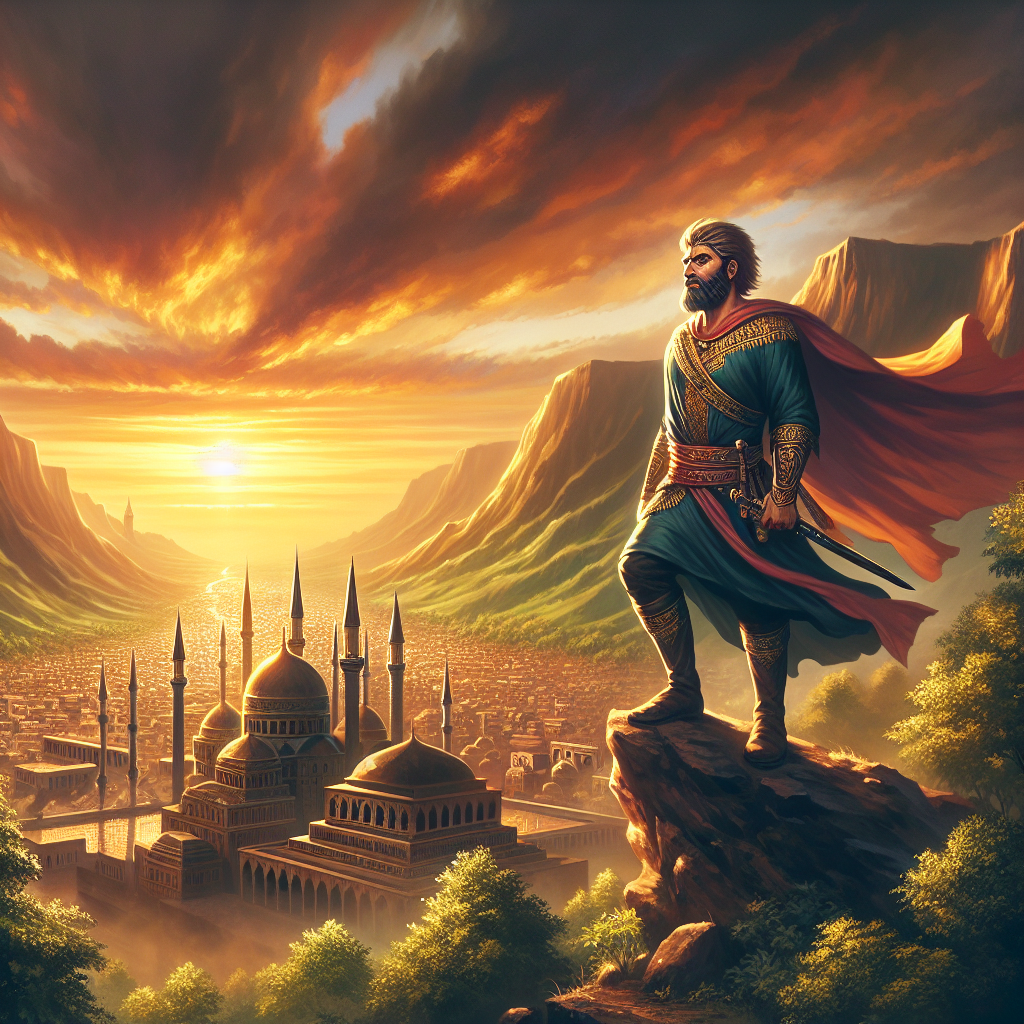In the tapestry of history, few names resonate with the blend of legacy and transformation as those of Osman Ghazi and his son Orhan Ghazi. Osman Ghazi, the visionary founder of the Ottoman Empire, left a legacy that would shape centuries. His leadership laid the foundation upon which his successors would build a vast empire. However, it was Orhan Ghazi who truly took the reins of this burgeoning power, expanding its reach and consolidating its authority in ways that set the stage for the Ottoman Empire’s enduring influence. This blog post will explore Orhan Ghazi’s rise to power, his strategic conquests, and his reforms that permanently altered the course of Ottoman history.
From Osman to Orhan: A Significant Transition in Leadership
Osman Ghazi’s death in 1326 marked a pivotal moment in Ottoman history. His son, Orhan Ghazi, inherited not just a growing empire but a legacy of ambition and strategy. This transition was a testament to the strong foundations Osman established, allowing for a peaceful succession. Orhan’s leadership was distinguished by his ability to capture Bursa, the first capital of the Ottoman Empire, shortly after assuming power. This significant conquest marked the beginning of his reign and showcased his military prowess.
Orhan’s Formative Years Under Osman’s Guidance
Orhan Ghazi’s early life was steeped in lessons of leadership and warfare. Under the tutelage of Osman Ghazi, Orhan learned the art of governance and military strategy. His participation in key battles, such as the conquests of Bilecik and Yenişehir, provided him with invaluable experience. Mentors like Sheikh Edebali imparted religious teachings, guiding Orhan’s vision for leadership. These early influences played a crucial role in shaping Orhan’s approach to both leadership and warfare.
Orhan’s Ascension and the Capture of Bursa
Orhan’s succession was smooth, thanks to the strong foundation laid by Osman. In 1326, Orhan’s capture of Bursa marked a turning point in Ottoman history. This conquest established Bursa as the first capital of the Ottoman Empire, symbolizing a new era under Orhan’s rule. The city became a vital center for administration and trade, reinforcing the Ottomans’ growing power in the region. Orhan’s initial success set the stage for further expansion and dominance.
Expanding the Empire’s Reach
Orhan’s reign was characterized by relentless military campaigns across northwestern Anatolia. He strategically expanded Ottoman territory through conquests of key cities like Nicaea (İznik) in 1331 and Nicomedia (İzmit) in 1337. These victories were pivotal in securing Ottoman control over Bithynia, a region crucial for trade and military strategy. Orhan’s successful incorporation of Byzantine and local populations into the Ottoman state exemplified his diplomatic acumen and ability to govern a diverse empire.
Groundbreaking Military Innovations
Orhan’s strategic use of ghazi warriors was a hallmark of his military strategy. These warriors, driven by religious zeal, were instrumental in expanding Ottoman territories. Orhan’s introduction of the Janissary corps marked a revolutionary shift in Ottoman military power. This professional standing army, composed of young Christian converts, became the backbone of Ottoman military might, ensuring superior organization and discipline on the battlefield.
Administrative Reforms Under Orhan’s Leadership
Orhan’s reign was notable for the establishment of key administrative institutions. He introduced the timar system, which allocated land to soldiers in exchange for military service, ensuring loyalty and stability. Orhan also incorporated Islamic law (Sharia) into the legal system, providing a structured framework for governance. The creation of a professional standing army, the Janissaries, further strengthened Ottoman military dominance, solidifying the empire’s foundations.
Diplomatic Alliances and Strategic Marriages
Orhan’s diplomatic prowess extended beyond the battlefield. His marriage to Theodora, daughter of the Byzantine Emperor John VI Kantakouzenos, exemplified his strategic approach to alliances. This marriage fostered increased cooperation between the Ottomans and the Byzantine Empire. Orhan’s diplomatic efforts with other Muslim states and Christian powers ensured stability and expansion. These alliances were instrumental in securing the empire’s position in a volatile region.
The Role of Religion in Orhan’s Governance
Orhan’s commitment to Islam was a defining aspect of his leadership. He promoted religious institutions, establishing mosques and madrasas (Islamic schools) to foster education and spiritual growth. The continuation of Sufi influence in the Ottoman court, supported by Orhan, further solidified the religious foundation of the empire. Orhan’s policy of tolerance toward non-Muslim subjects ensured stability in newly conquered territories, promoting harmony and unity.
The Lasting Impact of Orhan’s Conquests
Orhan’s conquests left an indelible mark on the Ottoman Empire’s trajectory. His strategic expansion consolidated Ottoman control in both Anatolia and Europe, transforming the empire from a small beylik into a major regional power. Orhan’s leadership laid the groundwork for future expansion into the Balkans under his son, Murad I. His legacy encompassed military prowess, administrative reform, and diplomatic strategy, setting the stage for the empire’s dominance.
Orhan’s Influence on His Sons
Orhan’s legacy extended to his sons, Murad I and Süleyman Pasha, who played pivotal roles in the empire’s future expansion. Orhan’s mentorship of Murad ensured a smooth transition of power and continued growth. Murad, following in his father’s footsteps, led the Ottoman expansion into Europe. Orhan imparted valuable military and administrative lessons, ensuring the empire’s enduring success through his sons.
The Legacy of Orhan Ghazi
Orhan Ghazi’s achievements as the successor to Osman Ghazi marked a defining era in Ottoman history. His pivotal role in expanding the empire, strengthening its political and military foundations, and fostering religious and cultural institutions set the stage for the Ottoman Empire’s dominance. Orhan’s leadership style, characterized by military prowess, administrative reform, and diplomatic strategy, left an enduring impact that shaped the course of history.
Reflecting on Orhan’s Enduring Influence
In conclusion, Orhan Ghazi’s contributions to the Ottoman Empire’s growth and consolidation were profound. His strategic vision, military innovations, and administrative reforms laid the groundwork for the empire’s future dominance. Orhan’s legacy continues to inspire historians and enthusiasts alike, reminding us of the enduring impact of visionary leadership on the course of history. For those interested in exploring further, consider immersing yourself in the fascinating world of Ottoman history.
Read More :: Read More Osman Ghazi Blog.
Osman’s Dream: The History of the Ottoman Empire
A books on Osman Ghazi, the Ottoman Empire, and related historical themes available on Amazon that may interest you:
Author: Caroline Finkel
Link: Osman’s Dream












